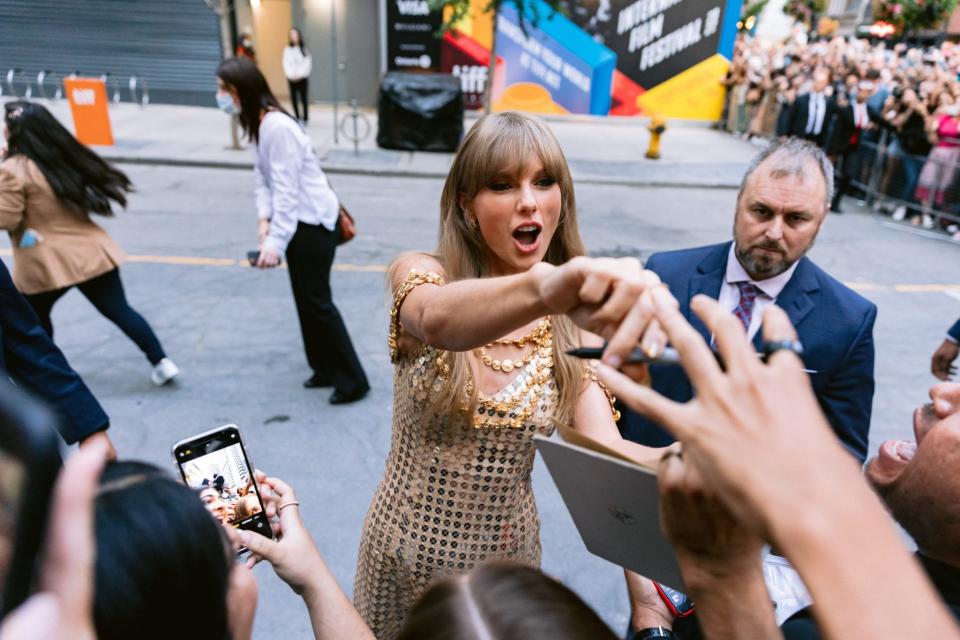Lyft CEO reveals the rideshare’s best tippers are Swifties still buzzing from the Eras Tour: ‘They’re in a pretty good mood and they’re more generous’

Consumers may be fed up with tipping, but there’s a few unlikely exceptions to the trend in the rideshare industry, Lyft CEO David Risher noticed.
“If you’re going to or from a Taylor Swift concert, you are much more likely to be a good tipper,” he told Fortune in its Leadership Next podcast.
Though from an unconventional source, the influx of tips from Swifties wasn’t random, Risher believed. He saw similar behaviors from ice cream lovers, saying Lyft passengers on their way to an ice cream shop typically tipped 20% to 30% more than average, and those leaving with bellies full of desserts tipped as much as 50% higher than average. He argued happy people are just less likely to skimp on tips.
“People’s behaviors actually are quite dependent on the mood they’re in,” he said. “And if they’re singing a Taylor Swift song, I guarantee you they’re in a pretty good mood and they’re more generous with their driver.”
Those openhanded tips have likely added up for Lyft: Last year, millions of Swifties flocked to U.S. stadiums, and Lyft shouldered the swell of rideshare traffic, reporting a 7.6% increase in total rides when cities hosted the ultra-popular Eras Tour, the company reported in January. In Nashville, where Swift calls home, there was a 24% leap in Lyft rides. The rideshare company said in its fourth-quarter earnings report that Swift, along with other beloved performers, contributed to its 4% revenue growth.
“Fans flocked to stadiums, with these rides growing by more than 35% year-over-year, driven by high-attendance stadium events including Taylor Swift and Beyoncé concerts,” the company wrote in its report.
Rideshare tip fatigue
While the Swift Effect is powerful, it still doesn’t solve the service industry’s pervasive tip-fatigue issue. Only about 28% of trips on apps like Uber and Lyft yielded tips for drivers, grid modernization software company Gridwise found in its 2024 Gig Mobility Report. That means tips account for 10% of a driver’s earnings, compared to grocery and food-delivery apps workers, who make 51% of their earnings from tips, according to the report.
"We saw some of the high fares, when it's more than $1,000 but zero tip, and that's for six hours of driving,” Gridwise CEO Ryan Green told CBS MoneyWatch.
Low and no tips have had real impacts on drivers, who organized strikes across the country earlier this year—demanding higher pay and fewer fees that sap chunks of their fares.
“These platforms continuously decrease driver earnings year after year as a means to show they are profitable to investors to get them to buy into their stock," Texas-based driver Shantwan Humphrey said in a February interview with Reuters.
But consumers don’t feel much motivation to open their wallets. USA TODAY’s Blueprint team and OnePoll found in two 2023 surveys that 63% of respondents believed too many businesses were asking for tips, with 80% of Gen Z saying they felt more pressure to tip. Most believed tipping had become too expensive or felt it wasn’t their responsibility to tip; rather, that it was the job of the business to pay workers fairly.
New York-based etiquette expert Thomas Farley told Business Insider passengers should tweak their attitudes toward the practice and follow the longstanding convention of tipping as long as your driver gets you to your destination in one piece.
“The convenience of being able to summon a car with a tap on one's phone—versus having to hail a taxi—should put us in the mindset of being even more likely to tip, not less," he said.
This story was originally featured on Fortune.com

 Yahoo Finance
Yahoo Finance 